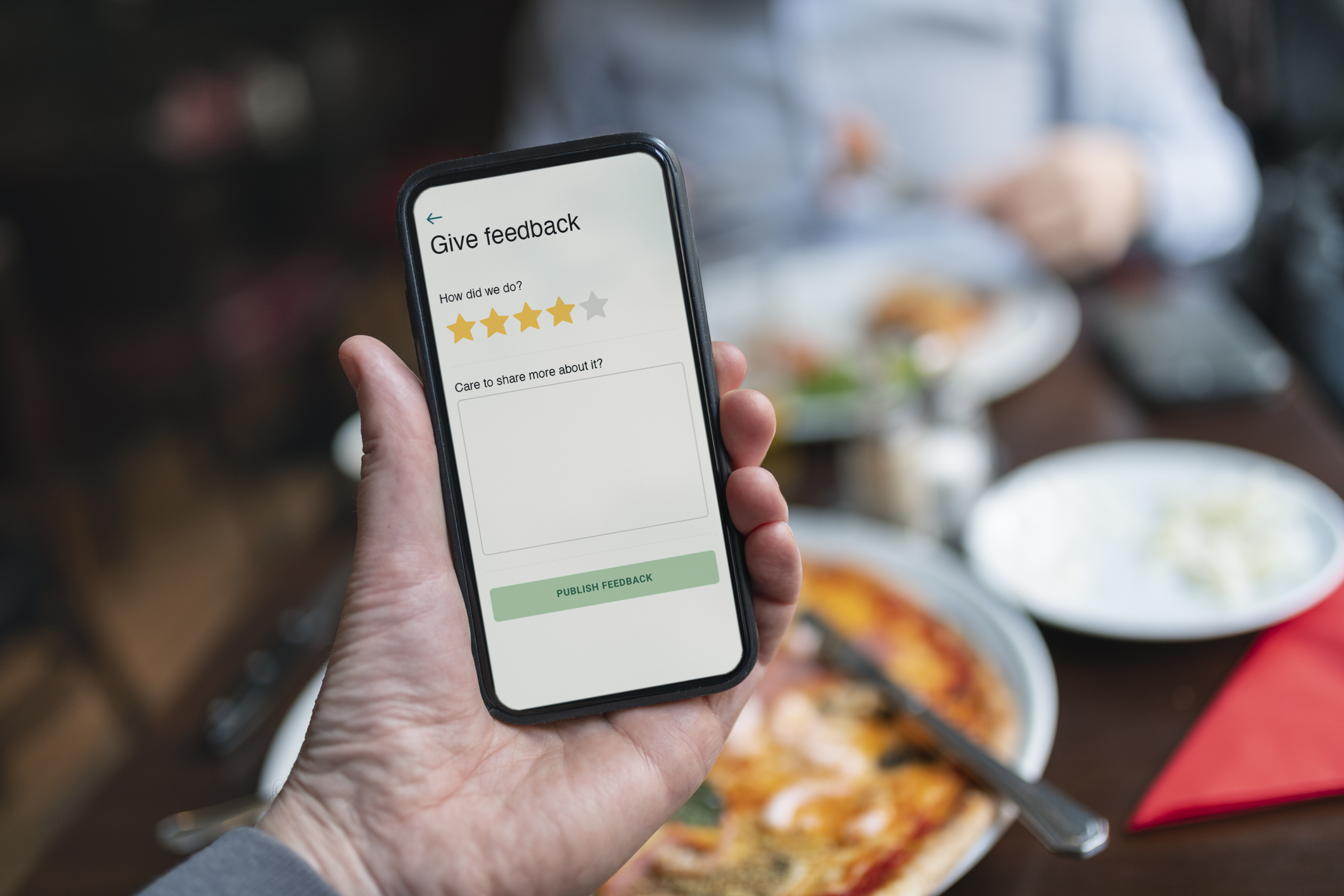Online Reviews You Can Use: Navigating Online Opinions for Better Buying
To find reliable advice, you may need to disregard over-the-top (or fake) complaints and praise. Learn to sift through the noise and make smarter spending decisions with genuine consumer insights.


Profit and prosper with the best of Kiplinger's advice on investing, taxes, retirement, personal finance and much more. Delivered daily. Enter your email in the box and click Sign Me Up.
You are now subscribed
Your newsletter sign-up was successful
Want to add more newsletters?

Delivered daily
Kiplinger Today
Profit and prosper with the best of Kiplinger's advice on investing, taxes, retirement, personal finance and much more delivered daily. Smart money moves start here.

Sent five days a week
Kiplinger A Step Ahead
Get practical help to make better financial decisions in your everyday life, from spending to savings on top deals.

Delivered daily
Kiplinger Closing Bell
Get today's biggest financial and investing headlines delivered to your inbox every day the U.S. stock market is open.

Sent twice a week
Kiplinger Adviser Intel
Financial pros across the country share best practices and fresh tactics to preserve and grow your wealth.

Delivered weekly
Kiplinger Tax Tips
Trim your federal and state tax bills with practical tax-planning and tax-cutting strategies.

Sent twice a week
Kiplinger Retirement Tips
Your twice-a-week guide to planning and enjoying a financially secure and richly rewarding retirement

Sent bimonthly.
Kiplinger Adviser Angle
Insights for advisers, wealth managers and other financial professionals.

Sent twice a week
Kiplinger Investing Weekly
Your twice-a-week roundup of promising stocks, funds, companies and industries you should consider, ones you should avoid, and why.

Sent weekly for six weeks
Kiplinger Invest for Retirement
Your step-by-step six-part series on how to invest for retirement, from devising a successful strategy to exactly which investments to choose.
When you’re splurging on a vacation, other travelers’ opinions can help you decide where to go. Their online reviews can point you toward hotels with great ambiance and ultra-comfortable beds and away from those marred by poor upkeep and noisy surroundings. Online reviews are more up-to-date than print guidebooks and reflect a more realistic experience than Instagram-famous travel “influencers.”
But scrolling through comments from strangers online has downsides: You might have to wade through dozens of overblown complaints — “Beach is too sandy,” for example — or vague praise — “I loved it” — to glean valuable information. Or a suspiciously effusive review could be a plant by the business owner, a friend or a hired promoter.
The problem with reviews. Travel websites Airbnb, Booking.com, Expedia, Vrbo, Hotels.com, Priceline and Viator allow only “verified” reviews, meaning the writers must have reserved through the site and completed their stay or activity before their assessment is posted.
From just $107.88 $24.99 for Kiplinger Personal Finance
Become a smarter, better informed investor. Subscribe from just $107.88 $24.99, plus get up to 4 Special Issues

Sign up for Kiplinger’s Free Newsletters
Profit and prosper with the best of expert advice on investing, taxes, retirement, personal finance and more - straight to your e-mail.
Profit and prosper with the best of expert advice - straight to your e-mail.
But at TripAdvisor and Google, reviewers don’t need to prove they experienced whatever they’re evaluating. Both sites say they look for and remove bogus reviews; TripAdvisor even participated in an investigation that resulted in a fake-review peddler in Italy being sentenced to prison.
Also, phony reviews have less impact today than several years ago because they’re crowded out by the huge volume of legitimate reviews. Sean O’Neill, an editor at Skift, a travel industry news site, says the most reliable surveys report that as much as 15% of TripAdvisor reviews are suspect, so “even in the worst case, most reviews are legitimate.”

Look beyond the stars. Sites often rate hotels and destinations using a star or numerical system, but this only tells part of the story. “Those scores are a great way to weed out the chaff,” says Chris Anderson, a professor at Cornell University’s School of Hotel Administration. “But a 4.2 versus a 4.0 is useless.” A classic old hotel, say, may receive a middling score because some visitors loved the historical experience while others expected modern amenities. You wouldn’t know that unless you read the reviews.
Sort reviews by date because things in the hospitality industry change frequently, says Ulrike Gretzel, of the University of Southern California’s Center for Public Relations.
Focus more on reviewers whose travel style is similar to yours than on authors who contribute a lot of reviews, she says. On Booking.com, TripAdvisor and other sites, you can filter by reviewers who traveled as a family, a couple, solo or for business.
Your best bet is to cross-check the same hotel, activity or tour on multiple sites for consistent observations. A few lesser-known review sites are worth a look as well. Oyster.com sends professional “investigators” to review hotels in 76 countries and cruises on about 100 ships.
For a highly curated look at hotels and resorts in 100 countries, Andrew Harper’s Hideaway Report sends anonymous reviewers to luxury hotels and resorts and recommends only its favorites. You’ll pay a steep $395 per year ($250 for a digital-only membership) but receive services such as updated online reviews, a printed monthly report, regional guidebooks and exclusive perks when booking through a partner travel agency.
Cutting through the noise: Finding reliable reviews
In an era where digital opinions can both inform and mislead, it's essential to approach online reviews with a discerning eye. By comparing multiple sources and critically evaluating the context behind each comment, you can separate genuine insights from mere noise.
Trusting a balanced mix of expert and user feedback empowers you to make smarter, more confident purchasing decisions in a crowded online marketplace.
related content
Profit and prosper with the best of Kiplinger's advice on investing, taxes, retirement, personal finance and much more. Delivered daily. Enter your email in the box and click Sign Me Up.

-
 How Much It Costs to Host a Super Bowl Party in 2026
How Much It Costs to Host a Super Bowl Party in 2026Hosting a Super Bowl party in 2026 could cost you. Here's a breakdown of food, drink and entertainment costs — plus ways to save.
-
 3 Reasons to Use a 5-Year CD As You Approach Retirement
3 Reasons to Use a 5-Year CD As You Approach RetirementA five-year CD can help you reach other milestones as you approach retirement.
-
 Your Adult Kids Are Doing Fine. Is It Time To Spend Some of Their Inheritance?
Your Adult Kids Are Doing Fine. Is It Time To Spend Some of Their Inheritance?If your kids are successful, do they need an inheritance? Ask yourself these four questions before passing down another dollar.
-
 9 Types of Insurance You Probably Don't Need
9 Types of Insurance You Probably Don't NeedFinancial Planning If you're paying for these types of insurance, you may be wasting your money. Here's what you need to know.
-
 Why It's Worth Booking a Winter Vacation
Why It's Worth Booking a Winter VacationTravel Smart In the early months of the year, travel demand dips — and so do prices.
-
 5 Ways to Save on a Trip to the 2026 Olympics in Italy
5 Ways to Save on a Trip to the 2026 Olympics in ItalyA guide to going to the Milan-Cortina 2026 Winter Olympics without breaking the bank.
-
 The Best (and Worst) Airlines for Flight Delays and Cancellations
The Best (and Worst) Airlines for Flight Delays and CancellationsWhich airlines should you book and which should you avoid if you want to make it to your destination on time?
-
 Four Luxury Spa Resorts for Well-Heeled Travelers
Four Luxury Spa Resorts for Well-Heeled TravelersWe hand-picked these U.S. luxury spa resorts for their serenity, amenities and dedication to the comfort of older travelers.
-
 Child-Free Cruises Perfect For Your Retirement Celebration
Child-Free Cruises Perfect For Your Retirement CelebrationHow to find a bespoke ocean or river vacation for adults. Many of these options are smaller, charming river cruises, expeditions, or niche experiences.
-
 Noctourism: The New Travel Trend For Your Next Trip
Noctourism: The New Travel Trend For Your Next Trip"Noctourism" is a new trend of building travel and vacations around events and plans that take place at night. Take a look at some inspiring noctourism ideas.
-
 My Husband and I Retired at 67 With $3.2 Million, But He's Frugal About Travel. How Can I Convince Him to Loosen Up?
My Husband and I Retired at 67 With $3.2 Million, But He's Frugal About Travel. How Can I Convince Him to Loosen Up?We asked financial planning experts for advice.